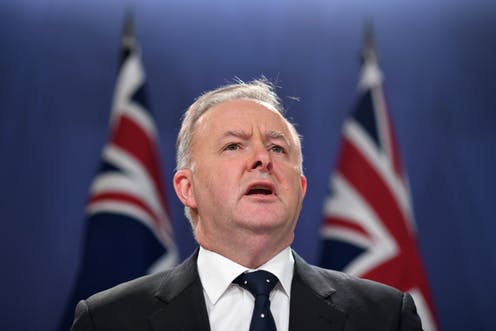Australian Prime Minister Anthony Albanese and opposition leader Peter Dutton have both pledged to defend the nation's interests as the U.S. considers imposing tariffs that could impact Australian beef exports. Despite a longstanding free trade agreement with the U.S., recent tensions have emerged over trade barriers and regulatory issues.
Albanese emphasized he would "stand up for Australian interests" and would not compromise on key national regulations, including the Pharmaceutical Benefits Scheme, biosecurity measures, and the Media Bargaining Code. The United States Trade Representative recently flagged these policies in a report on foreign trade barriers. One of the key concerns is Australia's ban on U.S. fresh beef imports, implemented in 2003 due to concerns over bovine spongiform encephalopathy (BSE).
Peter Dutton, leader of the Liberal Party, echoed a strong stance, saying he would not hesitate to confront global leaders if necessary to protect Australia's interests. Both leaders are gearing up for a federal election in May, with trade policy becoming a central issue.
Australia exported A$4 billion worth of beef to the U.S. in 2024, making it the country’s largest market. A decline in U.S. beef production has boosted Australian meat exports, especially to North America and Asia. However, tensions have risen as the Albanese government moves to tighten rules requiring tech giants like Google and Meta to pay for news content, which the U.S. views as a trade barrier.
While the U.S. accounts for less than 5% of Australia's goods exports, China remains its largest trading partner. Albanese noted Australia is also expanding trade ties with Southeast Asia and India, reducing reliance on any single partner.



 Trump Endorses Japan’s Sanae Takaichi Ahead of Crucial Election Amid Market and China Tensions
Trump Endorses Japan’s Sanae Takaichi Ahead of Crucial Election Amid Market and China Tensions  Bank of Japan Signals Readiness for Near-Term Rate Hike as Inflation Nears Target
Bank of Japan Signals Readiness for Near-Term Rate Hike as Inflation Nears Target  Japan Election 2026: Sanae Takaichi Poised for Landslide Win Despite Record Snowfall
Japan Election 2026: Sanae Takaichi Poised for Landslide Win Despite Record Snowfall  Missouri Judge Dismisses Lawsuit Challenging Starbucks’ Diversity and Inclusion Policies
Missouri Judge Dismisses Lawsuit Challenging Starbucks’ Diversity and Inclusion Policies  Pentagon Ends Military Education Programs With Harvard University
Pentagon Ends Military Education Programs With Harvard University  Trump Signs Executive Order Threatening 25% Tariffs on Countries Trading With Iran
Trump Signs Executive Order Threatening 25% Tariffs on Countries Trading With Iran  Singapore Budget 2026 Set for Fiscal Prudence as Growth Remains Resilient
Singapore Budget 2026 Set for Fiscal Prudence as Growth Remains Resilient  Trump Lifts 25% Tariff on Indian Goods in Strategic U.S.–India Trade and Energy Deal
Trump Lifts 25% Tariff on Indian Goods in Strategic U.S.–India Trade and Energy Deal  Federal Judge Restores Funding for Gateway Rail Tunnel Project
Federal Judge Restores Funding for Gateway Rail Tunnel Project  Trump Allows Commercial Fishing in Protected New England Waters
Trump Allows Commercial Fishing in Protected New England Waters  Nighttime Shelling Causes Serious Damage in Russia’s Belgorod Region Near Ukraine Border
Nighttime Shelling Causes Serious Damage in Russia’s Belgorod Region Near Ukraine Border  U.S. Announces Additional $6 Million in Humanitarian Aid to Cuba Amid Oil Sanctions and Fuel Shortages
U.S. Announces Additional $6 Million in Humanitarian Aid to Cuba Amid Oil Sanctions and Fuel Shortages  Japanese Pharmaceutical Stocks Slide as TrumpRx.gov Launch Sparks Market Concerns
Japanese Pharmaceutical Stocks Slide as TrumpRx.gov Launch Sparks Market Concerns  Thailand Inflation Remains Negative for 10th Straight Month in January
Thailand Inflation Remains Negative for 10th Straight Month in January  U.S. Stock Futures Slide as Tech Rout Deepens on Amazon Capex Shock
U.S. Stock Futures Slide as Tech Rout Deepens on Amazon Capex Shock  China Warns US Arms Sales to Taiwan Could Disrupt Trump’s Planned Visit
China Warns US Arms Sales to Taiwan Could Disrupt Trump’s Planned Visit  Silver Prices Plunge in Asian Trade as Dollar Strength Triggers Fresh Precious Metals Sell-Off
Silver Prices Plunge in Asian Trade as Dollar Strength Triggers Fresh Precious Metals Sell-Off 































